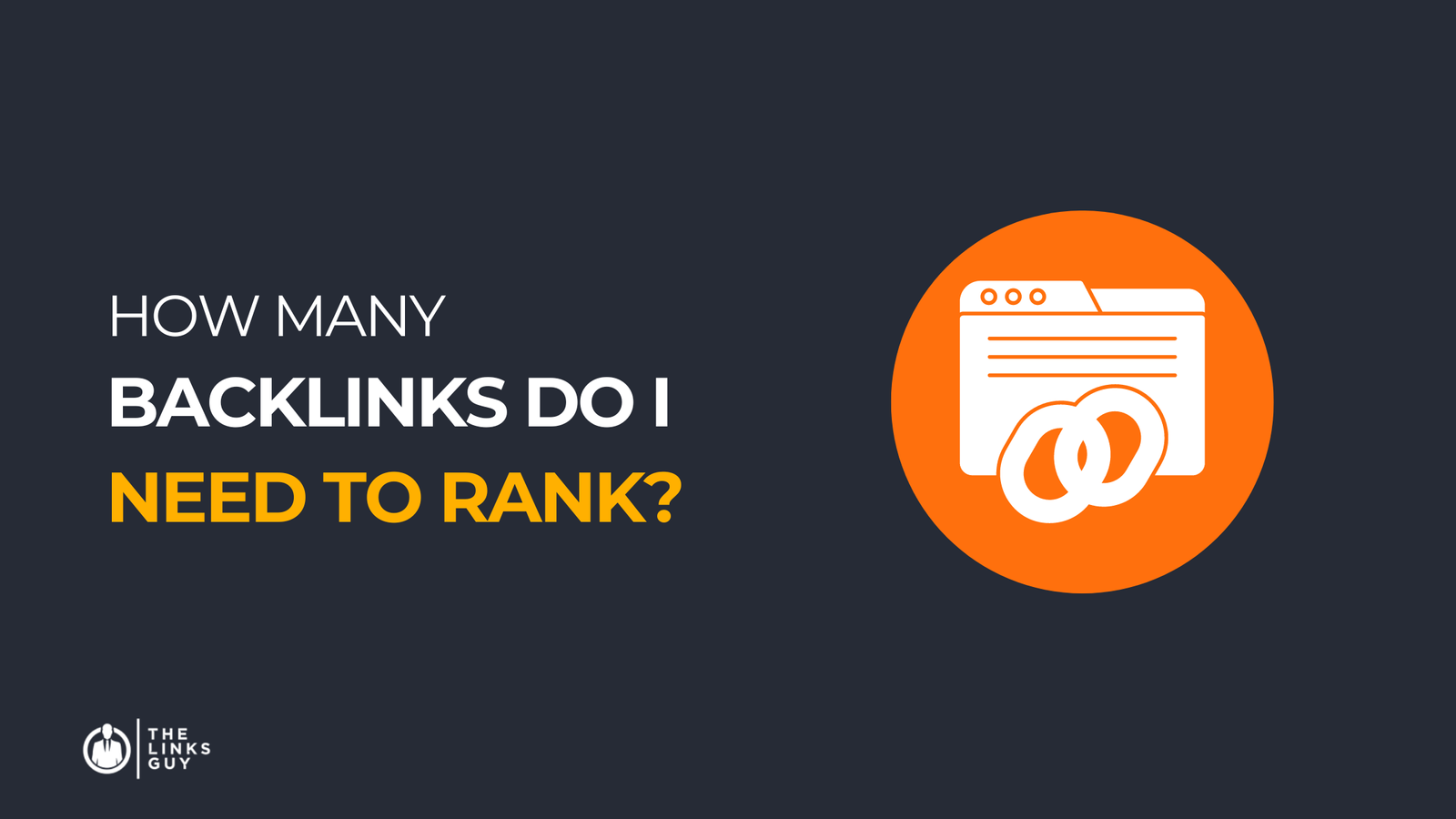To rank well on Google, you need backlinks. But how many?
How Many Backlinks Do I Need To Rank? The answer isn’t straightforward. It depends on many factors, like competition and content quality. In the world of SEO, backlinks are crucial. They act like votes of confidence from other websites. The more you have, the better your chances are of ranking higher.
But it’s not just about quantity. Quality matters, too. High-quality backlinks from reputable sites can boost your ranking significantly. Understanding how many backlinks you need requires a look at your competition, your niche, and the authority of the sites linking to you. This guide will help you navigate these factors to improve your SEO strategy.

Credit: tensemagazine.com
Introduction To Backlinks
Understanding backlinks is key for improving your website’s ranking. This section will introduce you to the concept of backlinks and their importance in SEO.
What Are Backlinks?
Backlinks are links from one website to another. They are also known as inbound or incoming links. They act as a vote of confidence from one site to another.
When a website links to your site, it signals to search engines that your content is valuable. This can help improve your site’s visibility and ranking.
Importance Of Backlinks
Backlinks play a crucial role in search engine optimization (SEO). Here are some key reasons why:
- Authority: Backlinks from high-authority sites can boost your site’s authority.
- Traffic: They can bring direct traffic to your site.
- Indexing: They help search engines find and index your site faster.
Backlinks are essential for building your site’s credibility. They indicate to search engines that other sites trust your content. This trust translates to better rankings and more visibility.
In summary, understanding backlinks and their importance can greatly enhance your SEO efforts. Focus on getting quality backlinks from reputable sources to improve your website’s ranking.

Credit: www.youtube.com
Backlink Quality Vs Quantity
Understanding the balance between backlink quality and quantity is crucial for SEO success. Many people wonder how many backlinks are needed to rank higher. The answer is not straightforward. The quality of backlinks often matters more than their quantity. Let’s explore this topic in detail.
Quality Over Quantity
High-quality backlinks have a significant impact on your website’s ranking. These links come from reputable, authoritative websites. They signal to search engines that your site is trustworthy. In contrast, numerous low-quality backlinks can harm your ranking. Search engines may view them as spammy and penalize your site.
Identifying High-quality Backlinks
High-quality backlinks share common traits. They come from websites with high domain authority. These sites have a strong reputation and are trusted by users. Additionally, high-quality backlinks are relevant to your content. A link from a related site carries more weight than one from an unrelated source.
Another factor is the context of the backlink. Links within the main content of a page are more valuable. They are seen as more natural and credible. Also, backlinks from sites with high traffic can boost your ranking. They indicate that your content is valuable to a larger audience.
In summary, focus on acquiring high-quality backlinks. They have a more profound effect on your ranking than merely accumulating a large number of links.
Factors Influencing Backlink Needs
Determining the exact number of backlinks needed to rank is tricky. Many factors influence this number. Understanding these factors helps you create an effective strategy.
Competition Analysis
One major factor is your competition. Check the top-ranking sites for your target keywords. Analyze their backlink profiles. How many backlinks do they have? Where do these backlinks come from? This data helps you gauge the effort needed to compete.
If your competitors have many high-quality backlinks, you might need more. If they have fewer, you might need less. Aim to match or exceed their backlink count.
Industry Specifics
Different industries have different backlink needs. Some industries are more competitive. This means you need more backlinks. Others are less competitive. Fewer backlinks might be enough.
Research your specific industry. Look at the backlink profiles of successful sites. Understand the norms and requirements. Tailor your backlink strategy to fit these specifics.
Evaluating Your Current Backlink Profile
Understanding your current backlink profile is crucial for improving your site’s ranking. Evaluating your backlinks helps you understand where you stand and what improvements are needed. Let’s dive into how you can evaluate your backlink profile effectively.
Using Seo Tools
SEO tools are essential for evaluating your backlink profile. These tools help you gather data about your backlinks efficiently. Some popular tools include:
- Ahrefs: Provides comprehensive backlink analysis.
- SEMrush: Offers detailed insights into your backlink profile.
- Moz: Known for its Domain Authority and backlink data.
- Majestic: Focuses on backlink history and trust metrics.
These tools help you identify the number, quality, and sources of your backlinks. They also show which backlinks are helping or hurting your site’s performance.
Interpreting Data
Once you’ve gathered data, it’s time to interpret it. Here are some key metrics to focus on:
- Total Backlinks: The total number of backlinks pointing to your site. More backlinks can indicate higher authority.
- Referring Domains: The number of unique domains linking to your site. A higher number of referring domains usually means better SEO performance.
- Anchor Text: The text used in the backlinks. Ensure that the anchor text is relevant and varied.
- Domain Authority (DA): A score that predicts how well your site will rank. Higher DA means better chances of ranking.
- Spam Score: Identifies potentially harmful backlinks. Aim for a low spam score to avoid penalties.
By analyzing these metrics, you can identify strong and weak points in your backlink profile. Focus on building high-quality backlinks from reputable sources to improve your ranking.
Strategies To Acquire Backlinks
Acquiring backlinks is crucial for improving your website’s search engine rankings. But how do you get these valuable links? Here are some effective strategies to help you acquire backlinks.
Content Creation
Creating high-quality content is one of the best ways to get backlinks. Write informative articles, guides, or blog posts. Make sure your content is original and valuable. People are more likely to link to useful content. Use images, videos, and infographics to make your content engaging. These elements can also attract more backlinks.
Guest Blogging
Guest blogging on other websites can help you gain backlinks. Write unique and insightful posts for other blogs. Include a link back to your site in the author bio or within the content. Make sure the blogs you choose are relevant to your niche. This way, you reach the right audience and get quality backlinks.
Social Media Engagement
Engage with your audience on social media platforms. Share your content and encourage others to share it too. The more people see your content, the higher the chances of getting backlinks. Join groups and forums related to your niche. Participate in discussions and share your expertise. This can lead to more backlinks from other members.
Common Backlink Mistakes
Backlinks are crucial for SEO success. But, many people make mistakes. These errors can harm your website’s ranking. Let’s explore common backlink mistakes you should avoid.
Avoiding Spammy Links
Spammy links can damage your website’s credibility. These are low-quality links from dubious sources. Search engines penalize websites with spammy links. Ensure your links come from reputable websites. Avoid buying cheap links from link farms. These might seem like a quick fix but harm your ranking in the long run. Always aim for quality over quantity.
Diversifying Link Sources
Relying on a single link source can be risky. It makes your link profile look unnatural. Search engines prefer a diverse link profile. Get links from various types of websites. Include blogs, news sites, and industry directories. This diversity shows that your site is trustworthy. Spread your backlinks across different domains. Avoid getting too many links from one website. This can raise a red flag for search engines.
Monitoring And Adjusting Your Backlink Strategy
Monitoring and adjusting your backlink strategy is crucial for maintaining good search engine rankings. Regular audits and updating content are key steps in this process. These actions help ensure that your backlinks remain relevant and valuable. Let’s dive into these important tasks.
Regular Audits
Conduct regular audits of your backlinks. Use tools like Ahrefs or SEMrush. These tools help you find broken or low-quality links. Remove or fix these links to keep your profile clean. Check for new backlinks to understand their impact. Make sure that all links are from high-authority sites. This practice helps maintain your ranking and improves your domain authority.
Updating Content
Keep your content fresh and relevant. Update old posts with new information. Add new links to your updated posts. This practice keeps your audience engaged. Search engines favor updated content. This can lead to better rankings. Ensure all new content is linked internally. This helps distribute link equity across your site.

Credit: www.searchlogistics.com
Case Studies And Success Stories
Understanding how many backlinks you need to rank can be challenging. Real-world examples and success stories offer valuable insights. By examining various case studies, we can learn effective strategies.
Real-world Examples
Many websites have achieved high rankings with different numbers of backlinks. For instance, one e-commerce site ranked in the top three positions with just 50 quality backlinks. They focused on obtaining links from reputable sources. Another tech blog reached the first page of search results with 200 backlinks. They targeted niche-specific websites for their link-building efforts.
A small business website improved its ranking with only 30 backlinks. They prioritized links from local directories and industry-related blogs. These examples show that the quality of backlinks often matters more than quantity.
Lessons Learned
From these case studies, we learn several key lessons. First, focus on quality over quantity. High-quality backlinks from trusted sources have a stronger impact. Second, target niche-specific websites. Relevant backlinks boost your ranking more effectively.
Another lesson is the importance of link diversity. Obtaining backlinks from various types of websites can strengthen your site’s authority. Lastly, patience is essential. Building backlinks takes time, but consistent efforts yield results.
These success stories and lessons can guide your backlink strategy. By learning from others, you can better understand how many backlinks you need to rank.
Frequently Asked Questions
How Many Backlinks Are Needed To Rank?
The number of backlinks needed varies. Quality is more important than quantity. Focus on high-quality, relevant backlinks.
Do More Backlinks Improve Google Rankings?
Yes, more backlinks can improve rankings. However, they must be from reputable and relevant sources.
How Do I Get Quality Backlinks?
Get quality backlinks by creating valuable content. Reach out to relevant websites and build relationships.
Are All Backlinks Treated Equally By Google?
No, not all backlinks are equal. Google values backlinks from authoritative and relevant sites more.
Conclusion
Figuring out the exact number of backlinks needed to rank can be tricky. Focus on quality over quantity. High-quality backlinks from reputable sites boost your ranking. Consistent efforts in building good backlinks yield results over time. Stay patient and persistent.
Make sure to create valuable content that attracts natural links. Keep an eye on your competitors and adapt your strategy as needed. Remember, SEO is a continuous process, not a one-time task.


